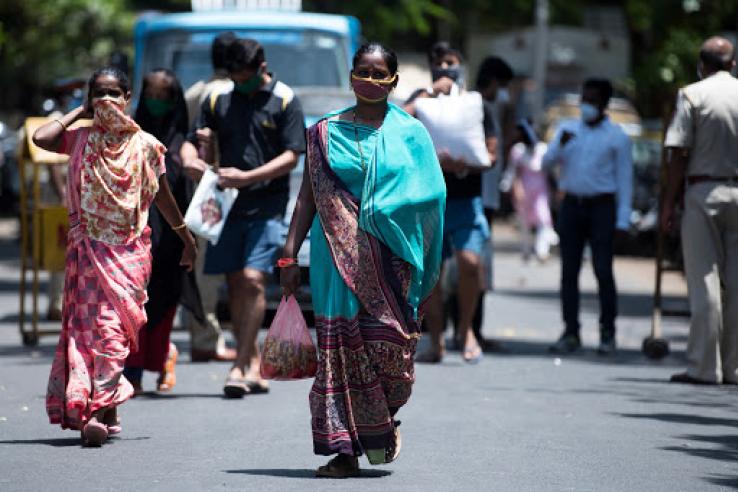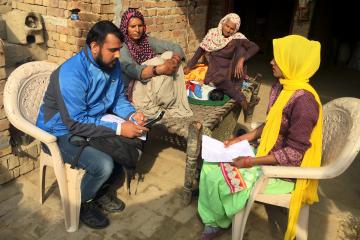
Taking an evidence-informed approach to pandemic response

As the COVID-19 pandemic started to take hold worldwide, J-PAL affiliated professors and staff jumped into action to critically analyze the evidence base related to health behavior change, domestic violence, cash transfers, education, and more. With this analysis, we have been working closely with government partners to inform policy decisions with evidence.
This is especially critical in times of global crisis, when decisions must be made quickly and confidently with millions of lives at stake. It is also much more difficult given the magnitude and ever-changing nature of our current health and economic challenges, the urgent need for action, and the limitations of real-time data.
Understanding how to apply existing evidence to pandemic response requires a close reading of the research and a deep understanding of local conditions. The world we live in is suddenly radically different from the world in which past RCTs were conducted; can the findings still be relevant to decision-making?
The short answer: It depends—on the way the study was designed, the strength of the findings, the mechanisms behind the results, and—critically—contextual and implementation details. In some cases, the core principles of generalizability can indeed help inform decision-making.
Supporting government responses
In Chile, for example, J-PAL LAC Scientific Director Francisco Gallego and affiliate Claudia Martinez, with support from J-PAL LAC staff, worked closely with the Ministry of Finance to design Chile’s cash transfer pandemic relief program, incorporating best practices from a large body of RCT literature. In recognition of this work and his longtime contributions to public policy Francisco received Pontificia Universidad Católica de Chile’s Abdon Cifuentes Award in June, given to academics in any field who have had a positive impact in the country. (Read a Q&A with Francisco.)
Claudia was also involved in the national accord between the government and the Finance Committee of the Senate to finance economic and social policies related to COVID-19. Now, Claudia, Francisco, and J-PAL affiliated professors Jeanne Lafortune and Jose Tessada are continuing to work with the Ministry of Finance to design several labor market policies using the best available evidence.
In India, J-PAL Director Abhijit Banerjee is advising the Government of West Bengal on pandemic response, and J-PAL Global Executive Director Iqbal Dhaliwal serves on a high-level advisory committee for the Government of Punjab to bring an evidence-based perspective to policy decisions affecting millions of people.
And in Egypt, Mexico, Morocco, South Africa, the United States, and many other countries, J-PAL affiliates and staff have also engaged with governments to provide policy insights from RCT literature. This reflects high demand from policymakers not only for evidence, but for guidance on how to interpret evidence responsibly and effectively.
Research innovation
The landscape of poverty in many countries is rapidly changing, and social service needs are higher than ever. We’re also leveraging J-PAL’s research infrastructure to help governments carry out large-scale surveys to quickly identify where social services are most needed and develop rapid policy responses.
In Indonesia, for example, J-PAL Southeast Asia Scientific Directors Rema Hanna and Ben Olken worked with the Ministry of National Development Planning and Ministry of Social Affairs to conduct a nationwide survey of almost 30,000 social development facilitators, and have been conducting regular online surveys since late March. Both surveys seek to learn how people’s lives have been affected by the pandemic, from job losses to food insecurity to financial distress.
The COVID-19 pandemic put a stop to dozens of ongoing J-PAL randomized evaluations around the world. As we begin to adapt to more permanent social distancing, we’ve had to adapt our research practices to ensure that people participating in research projects and the staff who carry out those projects stay safe and healthy, and are funding new COVID-related RCTs under strict health protocols.
In Italy, J-PAL affiliate Eliana La Ferrara and coauthor Michela Carlana are evaluating the impacts of a remote tutoring intervention for Italian schoolchildren who encountered difficulties with distance learning, possibly due to disadvantaged backgrounds.
In West Bengal, India, J-PAL Directors Abhijit Banerjee, Esther Duflo, and Ben Olken, with affiliates Marcella Alsan, Emily Breza, Arun Chandrasekhar, and coauthors conducted a large-scale SMS messaging campaign with 25 million people to encourage health-preserving behavior like social distancing and good hygiene, and encourage reporting of COVID-19 symptoms to local public health workers. The campaign increased health-preserving behavior and doubled the reporting of health symptoms, among other positive effects.
And in Ghana, J-PAL affiliates Dean Karlan, Robert Darko Osei, Chris Udry, and coauthors Ben Roth and Matt Lowe are evaluating the impacts of digital cash transfers as incentives for compliance with social distancing guidelines.
See more J-PAL-funded COVID-related studies on our initiative pages.
Looking forward
As we look to a future of ongoing social distancing, strained health systems, and economic challenges, we are continuing to fund new research to generate evidence on effective pandemic response. Much of this research is designed to generate quick results, and we’ll share these on the J-PAL website and with our partners as soon as they’re available.
We’re also pivoting our training work to shift our in-person training courses online, and we’re enrolling thousands of students in the online MITx MicroMasters in Data, Economics, and Development Policy.
And we will continue to work closely with government partners to keep data and evidence at the forefront of policy decisions. For the latest updates, visit J-PAL’s COVID-19 page.


